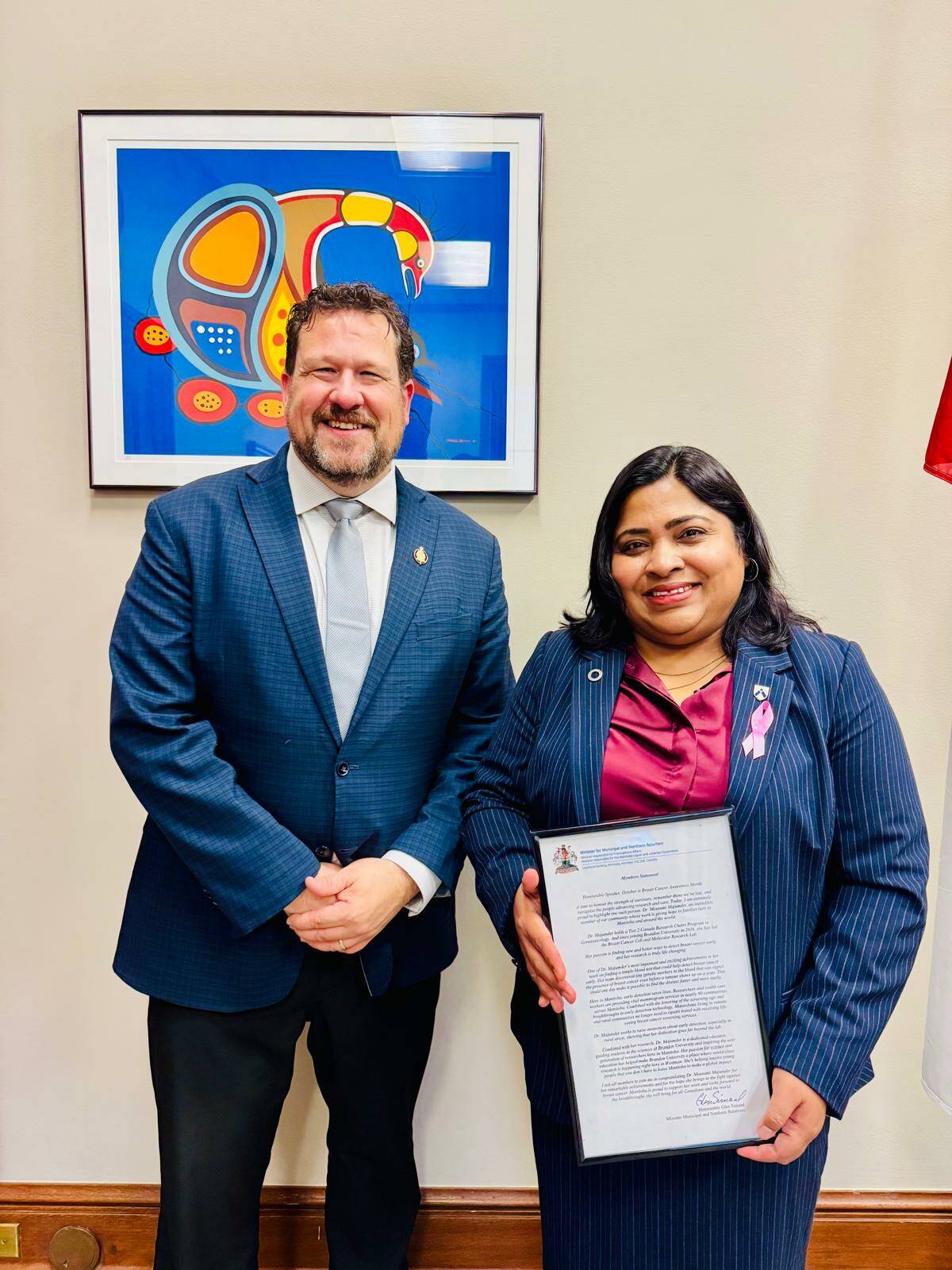Lifestyle
Brandon Researcher Honored for Breakthrough in Breast Cancer Detection

Brandon University researcher Mousumi Majumder received significant recognition in the Manitoba Legislature for her pioneering efforts in developing a blood test aimed at early breast cancer detection. This honor was conveyed through a Member’s Statement by Glen Simard, the MLA for Brandon East, who acknowledged her contributions during Breast Cancer Awareness Month.
Simard emphasized the impact of Majumder’s research, stating that her work is instilling “hope to families here in Manitoba and around the world.” He highlighted her team’s discovery of tiny genetic markers in blood that can indicate the presence of breast cancer, potentially before a tumor is visible on imaging scans. “Early detection saves lives,” he remarked.
Innovative Research in Genotoxicology
Majumder, who holds the position of Canada Research Chair (Tier II) in Genotoxicology, joined Brandon University in 2016. She has since spearheaded initiatives to identify microRNAs—small RNA molecules that can serve as biomarkers for early cancer detection. Her ultimate goal is to create a non-invasive blood test that complements traditional mammogram screenings, thereby facilitating the identification of breast cancer at its earliest and most treatable stages.
Regarding the recognition, Majumder expressed her surprise, noting that for researchers, achievement is often measured by publications in esteemed journals or securing competitive grants. “This was great. It was an unforgettable day for us,” she said. Initially, she thought the notification from the minister’s office was a scam, as it landed in her spam folder. “When I finally called and they said, ‘Dr. Majumder, we’ve been desperately trying to reach you,’ that’s when it hit me—this was real,” she recalled.
Collective Efforts and Future Challenges
During her visit to the legislature, Majumder was touched by the warm reception from the Members of the Legislative Assembly (MLAs), many of whom are alumni of Brandon University. “They treated me like a celebrity,” she noted. The honor, she explained, represents not just her individual efforts, but the collective contributions of her students and trainees. “When I stand there, I represent all of them—past, present, and future members of my lab. This recognition belongs to them,” she stated.
Majumder’s ongoing research aims to identify molecular markers that could detect breast cancer in blood samples prior to the emergence of physical symptoms or imaging results. “Our goal isn’t to replace mammograms but to support them,” she explained. By identifying cancer signatures in blood, the aim is to alert healthcare providers earlier, which could be especially beneficial for younger women who may not yet qualify for routine screenings.
While her findings are still undergoing validation, preliminary results indicate that certain microRNAs can detect breast cancer as early as stage one. This advancement could revolutionize early diagnosis methods. Yet, Majumder highlighted the need for expansion in research, citing a requirement for larger sample sizes and continued funding. “We’ve analyzed about 300 samples, but to fully validate our results, we need around 3,000. That’s the next big challenge,” she explained.
Simard reinforced the significance of her work, particularly for individuals in rural and remote areas of Manitoba who face obstacles in accessing cancer screening services. “Combined with the lowering of the screening age and breakthroughs in early detection, Manitobans no longer need to equate travel with receiving lifesaving breast cancer services,” he noted.
Majumder also expressed her gratitude towards the university and her colleagues. “I see myself as only a researcher,” she remarked. “But this honor reflects years of hard work and the collective spirit of Brandon University. We are truly humbled and grateful.”
-

 Education2 months ago
Education2 months agoBrandon University’s Failed $5 Million Project Sparks Oversight Review
-

 Lifestyle2 months ago
Lifestyle2 months agoWinnipeg Celebrates Culinary Creativity During Le Burger Week 2025
-

 Science3 months ago
Science3 months agoMicrosoft Confirms U.S. Law Overrules Canadian Data Sovereignty
-

 Health3 months ago
Health3 months agoMontreal’s Groupe Marcelle Leads Canadian Cosmetic Industry Growth
-

 Technology3 months ago
Technology3 months agoDragon Ball: Sparking! Zero Launching on Switch and Switch 2 This November
-

 Science3 months ago
Science3 months agoTech Innovator Amandipp Singh Transforms Hiring for Disabled
-

 Education3 months ago
Education3 months agoRed River College Launches New Programs to Address Industry Needs
-

 Technology3 months ago
Technology3 months agoGoogle Pixel 10 Pro Fold Specs Unveiled Ahead of Launch
-

 Technology1 month ago
Technology1 month agoDiscord Faces Serious Security Breach Affecting Millions
-

 Business2 months ago
Business2 months agoRocket Lab Reports Strong Q2 2025 Revenue Growth and Future Plans
-

 Science3 months ago
Science3 months agoChina’s Wukong Spacesuit Sets New Standard for AI in Space
-

 Education3 months ago
Education3 months agoAlberta Teachers’ Strike: Potential Impacts on Students and Families
-

 Technology3 months ago
Technology3 months agoWorld of Warcraft Players Buzz Over 19-Quest Bee Challenge
-

 Business3 months ago
Business3 months agoNew Estimates Reveal ChatGPT-5 Energy Use Could Soar
-

 Business3 months ago
Business3 months agoDawson City Residents Rally Around Buy Canadian Movement
-

 Technology1 month ago
Technology1 month agoHuawei MatePad 12X Redefines Tablet Experience for Professionals
-

 Technology3 months ago
Technology3 months agoFuture Entertainment Launches DDoD with Gameplay Trailer Showcase
-

 Technology3 months ago
Technology3 months agoInnovative 140W GaN Travel Adapter Combines Power and Convenience
-

 Business3 months ago
Business3 months agoBNA Brewing to Open New Bowling Alley in Downtown Penticton
-

 Technology3 months ago
Technology3 months agoGlobal Launch of Ragnarok M: Classic Set for September 3, 2025
-

 Science3 months ago
Science3 months agoXi Labs Innovates with New AI Operating System Set for 2025 Launch
-

 Education2 months ago
Education2 months agoNew SĆIȺNEW̱ SṮEȽIṮḴEȽ Elementary Opens in Langford for 2025/2026 Year
-

 Technology3 months ago
Technology3 months agoNew IDR01 Smart Ring Offers Advanced Sports Tracking for $169
-

 Technology3 months ago
Technology3 months agoDiscover the Relaxing Charm of Tiny Bookshop: A Cozy Gaming Escape










